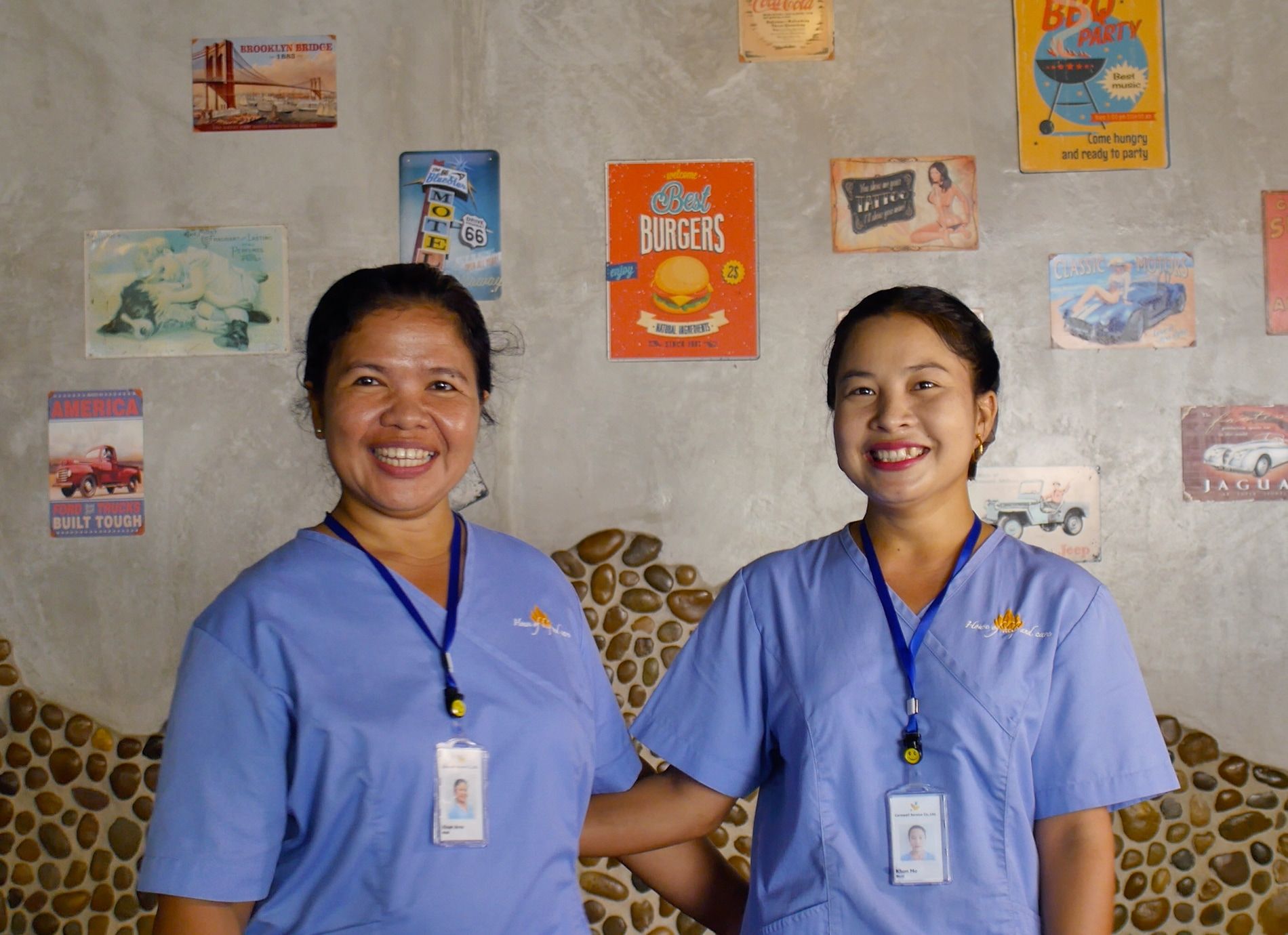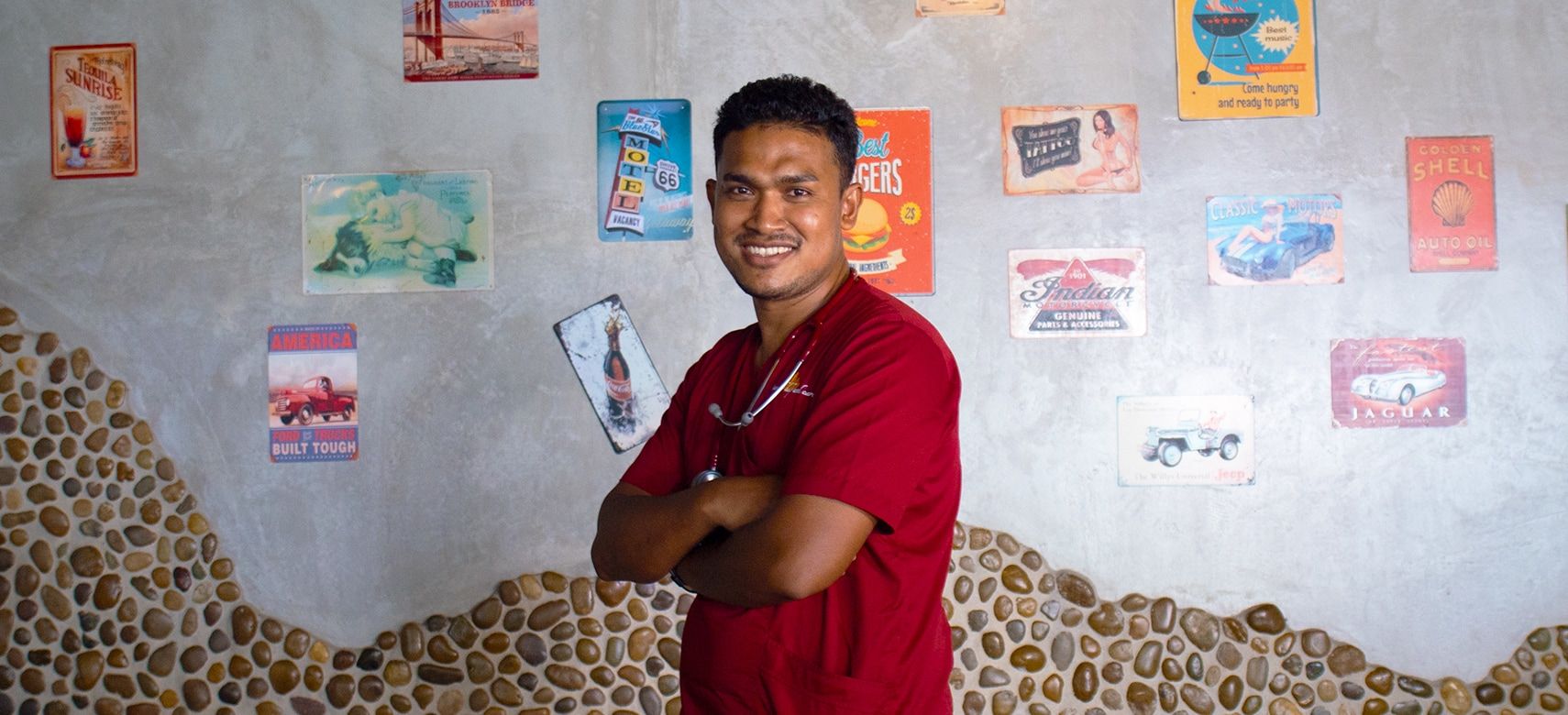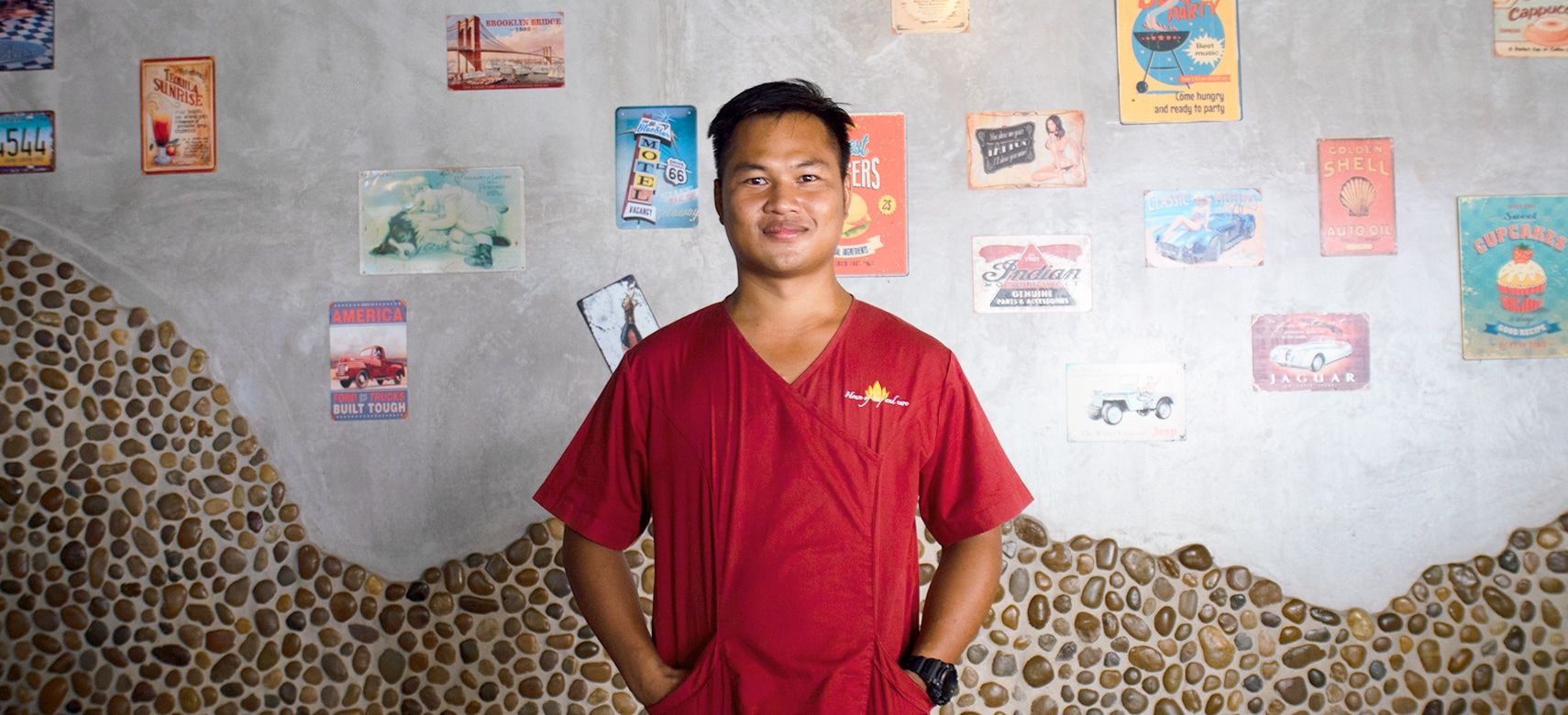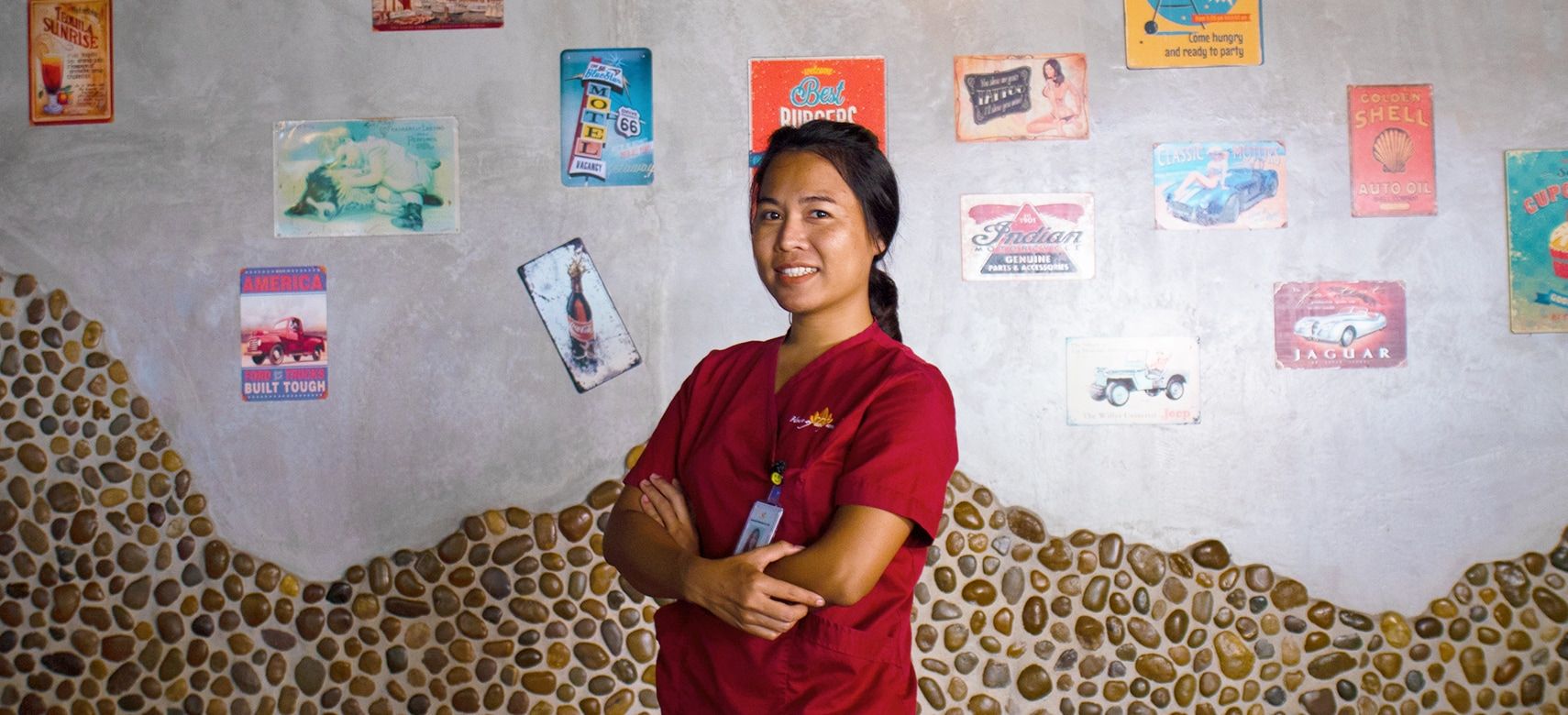Carewell Staff

Mitarbeiter kommen zu Wort
Ein Pflege-Resort wie Carewells Baan Tschuai Duu Lää lebt und wächst mit der Erfahrung, dem Wissen und den Persönlichkeiten der Mitarbeiter. Deshalb möchte wir mit Ihnen die Geschichten von einigen unserer wichtigsten Pflegemitarbeitern teilen.

Was sind Deine Aufgaben?
Ich bin verantwortlicher Leiter der Pflegeabteilung in Baan Tschuai duu lää. Mit meinem Team von 50 Mitarbeitern (Krankenschwestern, Krankenpfleger und Physiotherapeuten) sind wir für die Umsetzung der Pflegeanordnungen, der täglichen Gästebetreuung (aktive Tagesgestaltung) und für physiotherapeutische Massnahmen zuständig. Wir betreuen in Baan Tschuai duu lää im Moment 22 Langzeitgäste und sind somit ausgebucht. Baan Tschuai duu lää verfügt über 8 Villen mit eigenem Pool und je 3 Gästezimmern. Zwei Gästezimmer sind als Notfallzimmer eingerichtet und normalerweise nicht belegt. Diese Zimmer halten wir für Notfälle oder für REHA Plätze frei. Wir werden von den Spitälern hier auf Phuket immer wieder für REHA Plätze und Aufenthalte angefragt.
Bei uns in Baan Tschuai Duu Lää können sich die Gäste in einer schönen, modernen Umgebung sicher wie zu Hause zu fühlen und profitieren von einer professionellen und individuellen Pflege und Betreuung.
In Baan Tschuai duu lää arbeiten wir wie in einem Spital im Schichtbetrieb. Morgenschicht, Nachmittags- und Nachtschicht zu je 8 Stunden täglich und dies 7 Tage die Woche. Dies bedeutet, dass jeder Gast während 24 Stunden und dies 7 Tage die Woche eine Krankenschwester oder –pfleger an seiner Seite hat. Dies ist auch bei Ausflügen oder bei einem Spitalaufenthalt der Fall. Zu meinen Aufgaben gehört auch die Zuweisung und Einsatzplanung einer meiner Mitarbeiter zum jeweiligen Gast.
Ich begleite die neuen Mitarbeiter während der Einführungsphase und bei der Weiterbildung in unsere Pflegeprozesse damit ein reibungsloser Ablauf der Pflegeprozesse und -verfahren gewährleistet ist. Die wöchentlichen Teamsitzungen und Mitarbeitergespräche sind wichtig damit ich mir einen aktuellen Gesamteindruck zu unseren Gästen machen kann. Beim täglichen Rapport mit Anita werden die neuen Verordnungen und Pflegeanweisungen sowie die Anpassung der Medikationen festgelegt. Warum hast Du den Beruf als Krankenpfleger gewählt?
Als ich 17 Jahre alt war, fragte mich mein Freund, Khun Nan: "Möchtest Du älteren Menschen helfen und diese pflegen? "Ja warum nicht, klar, Ich möchte es zumindest versuchen," war meine Antwort. Schon bald war mir klar, dass ich später in meinem Beruf in der Pflege arbeiten möchte. Nein, nicht nur ältere Menschen zu pflegen, sondern überhaupt, ganz generell, wenn ich anderen Menschen helfen kann, habe ich ein gutes Gefühl. Natürlich gibt es auch weniger angenehme Aufgaben oder schwierige Situationen, aber dies gehört dazu und schreckte mich nie ab. Ich wusste immer, dass ich damit jemandem meine Hilfe anbieten kann und Gutes tue.

Was sind deine Aufgaben bei Carewell?
Ich arbeite im Baan Tschuai duu lää als Physiotherapeut. "In erster Linie helfe ich unseren Gästen, welche körperlich in ihrer Bewegungsfreiheit eingeschränkt sind mit aktiver oder passiver Bewegungstherapie die Situation zu verbessern oder zu stabilisieren und Schmerzen zu lindern”. In unserer Physiotherapie Gruppe arbeiten wir für die Gäste individuelle Behandlungspläne und -methoden aus und legen die Intensität der Behandlung fest.
Je nach den Bedürfnissen und Fähigkeiten der Gäste, wird die Therapie zur Wahrung der Privatsphäre auch im Zimmer des Gastes durchgeführt (sofern möglich). Meist jedoch in unserem Trainingsstudio oder im Swimming Pool für Aquafitness. Wir Verfügen über ein Ergometer Trainingsrad, Laufband, Trainingsgewichte, Stepper, verschiedenste Bälle für Koordinations- und Balanceübungen, Ultraschallgeräte und Elektrotherapie. Wir beschäftigen 3 ausgebildete Physiotherapeuten mit Uni-Abschluss. Zum erweiterten Angebot der Physiotherapie gehört unser eigenes Spa- und Wellnesscenter mit traditioneller Thai-Massage, Fuss-oder Gesichtsmassage, sowie Aromatherapie. Vier unserer Krankenschwestern habe zusätzlich alle Lehrgänge in traditioneller Thai-Massage und Aromatherapie mit Erfolg abgeschlossen.
Oft verlagern wir die Physiotherapie direkt an den nahgelegenen Strand um dort im Sand oder im kniehohen warmen Wasser der Andaman-See zusammen mit unseren Gästen zu laufen und zu schwimmen. Dies wird von unseren Gästen sehr geschätzt und sie lieben es sich so frei am Strand bewegen zu können und manchmal bleiben die Turnübungen zugunsten von Muscheln sammeln auf der Strecke. Das spazieren barfuss am Strand ist einerseits Fussmassage pur und hilft die Muskeln zu stärken und die Balance zu verbessern. Ein Blick aufs Meer ein Eis essen am Rawai Strand da machen bei der Physiotherapie alle Gäste freiwillig mit.

is affectionately called 'Umli' by the owner, Anita, because of her petite size and that she is much smaller than a former colleague who was also named Um. She is in charge for all Guest activities by CAREWELL.
Not Just a Nurse But a Creative Activities Proponent
As an experienced nurse, Um provides practical and eldercare nursing services to the guests. “I still perform nursing duties such as giving medication to guests, changing diapers, cleaning and bandaging wounds. I also train the new nurses.”
Um is certified in Deep Tissue Thai Massage Therapy and manages the CAREWELL Massage Team. She also runs the Guest Activities program, for which she creates monthly plans of daily activities and “off campus” excursions. Because Um, has such a creative streak and the gift of being able to watch and do, she’s taken on projects like decorating the Massage Sala and Activities Tent; creates flower bouquet offerings and kratongs; as well as organizes the annual holiday party and choreographs dances for it. She learned to cut hair by watching and shares this skill with the guests and even staff members.
Um tries to keep the guests involved and active. “Some are mobile and can get around. Others cannot. I...well, we care for them in their rooms and help move them around to different places at CAREWELL. This way, they remain integrated and involved in the community. We wheel them to the common areas or outside by the beaches around. We also have a own Restaurant- cafe and a massage room. Recently, we created an activities tent where we show movies, play music, games and some guests prefer to have their meals out there. Some come to talk and some come to just relax. It’s a nice area for everyone to gather when they feel up to it...or if they want some company.”
Some of the activities Um puts together consists of cooking simple dishes such as Thai desserts; painting and coloring; salon activities such as haircuts, manicures and pedicures; board games and group games where staff and guests play together with large light balls; pétanque; badminton; ping pong; swimming; aerobics/dancing, “I show them steps they can do standing or sitting, whatever their abilities. We can do these for an hour or two, depending upon the activity.”
“We watch current movies and movies from their time. We project them onto a big screen. We plan for 4 to 5 movies per week. The guests really enjoy them...especially the old movies because they take them back to their ‘good ol’ days.’ The old movies have many benefits. It triggers the memory; brings up feelings of nostalgia; gives them a sense of belonging, because they feel a part of it...a part of ‘home,’ if you will. We do this in the evenings in the Activities Tent, which is open and airy, so it’s like watching movies out-of-doors which complements that sense of freedom, independence, they knew back then.”
"I try to make this a communal operation. If the staff have ideas for activities they believe the guests will enjoy, we will get the necessary supplies."
Um’s Educational Journey
Before becoming a nurse, Um was a telephone operator. It was Um’s parents who suggested a nursing career path. She did not think she would like it but agreed to go through the program to understand what it was like to work with patients; and would make her decision before testing began.
At the end of the program, Um had made her decision to leave. Then the 2013 floods of Bangkok happened. “I had nothing, but I knew I could take care of myself. My body worked. I could get around. But others could not. Big vehicles would bring food for me and the other students. Others, who could not get around, could not take care of themselves. I saw this. So I called the school and talked to my Doctor-teacher. He was not very happy with me, ‘You go? You fly away? Why? People stay and take care of patients in the hospital. The patients cannot walk. They cannot eat. But you go. You go out. You fly away! Why? How can you? How can you leave?’”
Um reflected, “There were patients in a room not far from me. They could not eat. They could not shower...I could not just leave them.”
Returning back to school for testing, Um found it difficult to deal with dementia patients. She would get as angry as the patients. With the mentoring of her doctor-teacher, Um began to understand she had internal issues of her own that she must confront. He told her, “The patients have dementia. Mental disabilities that do not allow them to control their anger. You do not have that. And you do not have patience...but you can. You cannot fight with the patients, but you can control your anger. You can control yourself. Why do you have anger? You must understand your anger. You can.”
Thus began Um’s own journey, with the help of her mentor. Once Um came to understand her own internal struggles, she came out from under that dark shadow and her outlook changed. Now, learning and understanding more and more about the progression of Alzheimer’s created more and more sympathy within her. “Nurses understand pain. They understand headache. But dementia and Alzheimer’s needs an additional nursing skill-set. When I came to understand this, I didn’t even mind changing diapers anymore. I just wanted to help them because they could not help themselves. I want to make things better for them.”
"Even now, I go home and I find myself problem-solving for our guests, 'How can we make 'this' easier for them? How can we do 'this' better? How can I get '[this guest]' to become more responsive to 'this'? Sometimes, I find I have been sitting at home running solutions through my head, trying to solve this issue or that and then realize hours have passed. Sometimes I even have dreams about how I can help or about different activities I can do with them.”
Um ended up completed 3 separate study programs to 1) work with the hospital patients; 2) care for the elderly; and 3) work with small children and infants. This included the 1-year study program in Bangkok with 6 months of intense practical training and testing over constant 12- hour shifts at the hospital. “Being on my feet for so long, my legs were often so tired.” She also went to Chiang Rai to study at the Military Academy Nursery for a course to learn about working babies and small children. It is a nursery for children of military parents. It was a very strict program.”
"When studying to care for babies and small children, I found there are similar techniques for care and training when working with Alzheimer's and dementia patients. As the dementia moves from the back of the head to the front, there is more and more loss of cognizance and reasoning. And like babies, progressed dementia results in a loss of reasoning. Babies do not have the experience for reasoning, yet. So we must be patient with both. But we can train both, babies...small children and adults with early stage dementia, using repetitious behavior. We must comfort them so they feel safe. We cannot become frustrated and angry also, this will only increase their own frustration and anger. I explain and try to be the example of this to our new and younger nurses."
“While at University, learning to read body language was an important part of my studies. Not everyone speaks the same language so I must observe to determine where they have pain. Sometimes it's external, like a wound or bruising to the arm, side, foot. Or it might be internal...head, stomach or nerves, muscular, fractured bone...This is some of what I train and review with the new nurses."
The Road to CAREWELL
Just before coming to CAREWELL, one of Um’s patients was an elderly grandfather in Chiang Rai, who had suffered a stroke. He was bedridden with paralysis in his legs and arms. The doctor said he would not walk again. But Um believed he would. She sought out a doctor of Traditional Chinese Medicine. His test results indicated her patient could indeed be helped. Um continued caring for the grandfather during the Chinese medicine, acupuncture and Thai massage treatments. After 5 months of treatments, her grandfather-patient recovered 80% of his functionalities. He was able to walk and care for himself, again. While Um was now in need of a new job, she was thoroughly happy and proud to have been a part of her patient’s recovery. She then set off for Phuket. Not long after, her mentor would tell her about Carewell.
CAREWELL was still in need of another good nurse. Khun Nan had called Um’s university and spoke to Um’s mentor. Nan asked him if he would recommend a good and reliable nurse.
Um met and liked her new boss, Anita, very much. She also loved the beautiful and tranquil setting of CAREWELL and still feeling ‘on top of the world’ about her former grandfather-patient’s recovery, Um felt very fortunate and positive about her career as a nurse. She held great gratitude toward her mentor.
Um has now been at CAREWELL for 6 ½ years. When she first began at CAREWELL, there were only 5 guests. Now it has blossomed into a wonderfully large communal family of 24 guests and a staff of more than 60 made up of nurses, physical therapists, a chef, administration, housekeepers and gardeners to care for the guests and their environment.
‘We’re a happy family because it’s a good family. I have learned much at CAREWELL and Anita has been good to me...to all of us. I am proud I am a nurse. I help people. That is good'



